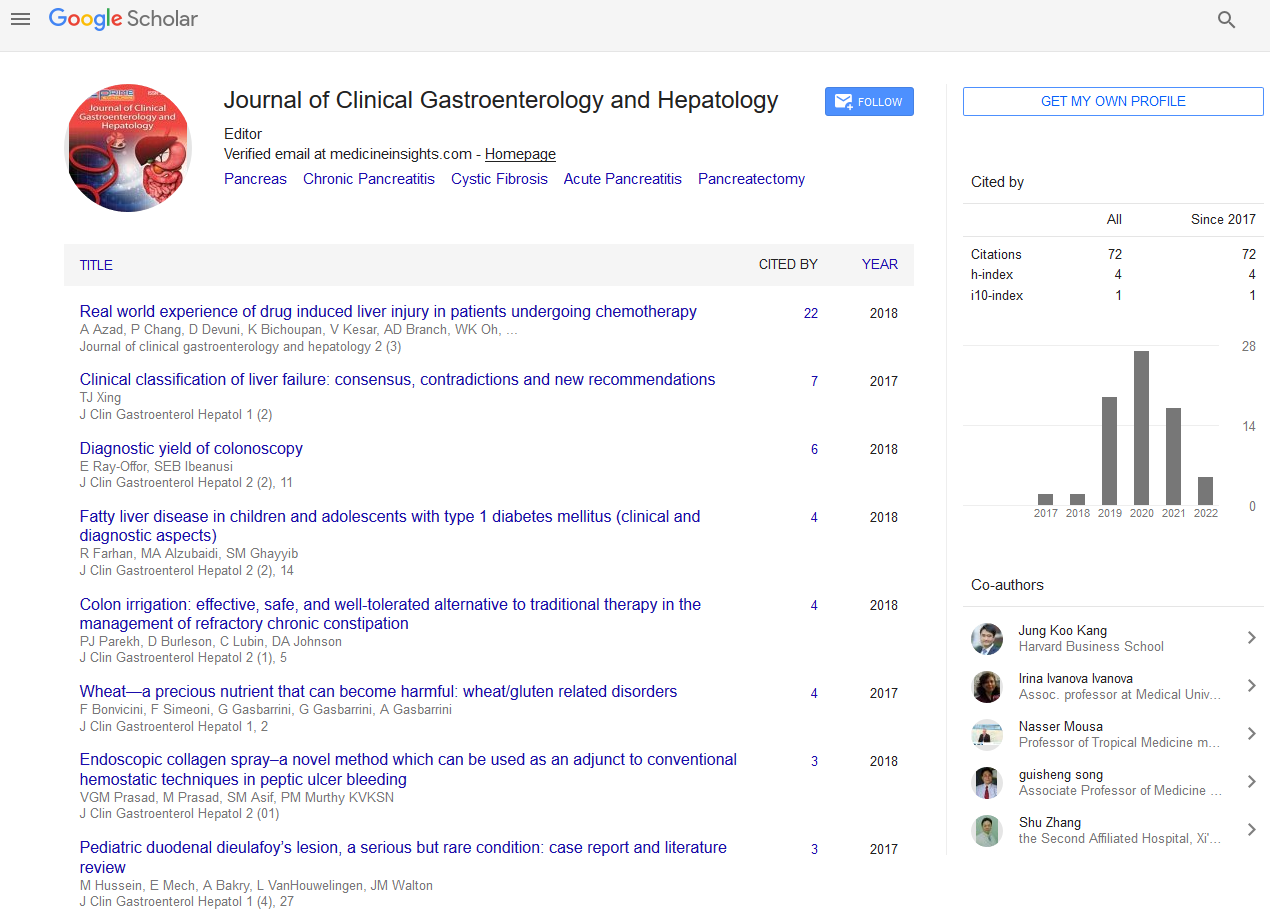Commentary - (2024) Volume 8, Issue 6
Microbiome and Gastrointestinal Health: The Future of Clinical Gastroenterology
Jurgen Michael*
Department of Gastroenterology, University of Alberta, Canada
*Correspondence:
Jurgen Michael,
Department of Gastroenterology, University of Alberta,
Canada,
Email:
Received: 02-Dec-2024, Manuscript No. IPJCGH-25-22566;
Editor assigned: 04-Dec-2024, Pre QC No. IPJCGH-25-22566 (PQ);
Reviewed: 18-Dec-2024, QC No. IPJCGH-25-22566;
Revised: 23-Dec-2024, Manuscript No. IPJCGH-25-22566 (R);
Published:
30-Dec-2024, DOI: 10.36648/2575-7733.8.6.52
Description
A clinical gastroenterologist is a medical professional trained
in identifying and managing digestive disorders. They perform
diagnostic procedures, including endoscopy and colonoscopy,
to examine the GI tract. They also prescribe treatments ranging
from dietary modifications to pharmaceutical interventions
and, in some cases, surgical procedures. Provide detailed
imaging of abdominal organs for detecting tumours, infections,
and inflammatory conditions. Tissue samples obtained during
endoscopy or colonoscopy help diagnose conditions like celiac
disease, inflammatory bowel disease, and cancer. Treatment
for GI disorders varies based on the underlying condition
and severity. Approaches include lifestyle modifications,
medications, and surgical interventions. Avoiding acidic foods,
weight loss, and elevating the head during sleep can help
reduce symptoms. The low FODMAP diet helps alleviate IBS
symptoms. Reducing alcohol consumption and maintaining a
healthy weight can prevent fatty liver disease. Reduce stomach
acid production for conditions like GERD and ulcers. Used in
IBD treatment to control inflammation. Treat infections such
as Helicobacter pylori. Help relieve motility disorders. Clinical
gastroenterology is continuously evolving with advancements
in technology, personalized medicine, and minimally invasive
procedures. AI-assisted endoscopy improves polyp detection
rates and enhances early cancer diagnosis. Understanding
the gut microbiomeâ??s role in health and disease has led
to the development of probiotics and Faecal Microbiota
Transplantation (FMT) as therapeutic options. Breath tests
and capsule endoscopy provide less invasive options for
diagnosing GI conditions. Targeted therapies for conditions like
IBD and liver diseases are emerging, providing more effective
and personalized treatment options. Clinical gastroenterology
is a vital field that addresses a wide spectrum of digestive
disorders, improving patientsâ?? quality of life through innovative
diagnostics and treatment strategies. As technology and
research continue to advance, the future of gastroenterology
holds great promise in enhancing disease prevention, early
detection, and personalized care for gastrointestinal conditions.
Clinical gastroenterology is a specialized branch of medicine
focused on the diagnosis, treatment, and management
of diseases affecting the Gastrointestinal (GI) tract. This
includes disorders of the oesophagus, stomach, intestines,
liver, pancreas, and gallbladder. Given the complexity and
essential nature of the digestive system, gastroenterologists
play a critical role in maintaining overall health and treating
a wide range of conditions that affect digestion and nutrient
absorption. Clinical gastroenterology is an evolving field
that continues to improve the diagnosis and treatment of
digestive disorders. With ongoing research and technological
advancements, the future of gastroenterology promises even
better outcomes for patients. Gastroenterologists remain at
the forefront of medical innovation, ensuring digestive health
and overall well-being. Dietary changes, exercise, and smoking
cessation. Medications such as Proton Pump Inhibitors (PPIs),
anti-inflammatory drugs, and antibiotics. Including removal
of polyps, control of bleeding, and dilation of strictures. For
severe cases of IBD, cancer, or gallbladder disease.
Acknowledgement
None.
Conflict Of Interest
The authorâ??s declared that they have no conflict of interest.
Citation: Michael J (2024) Microbiome and Gastrointestinal Health: The Future of Clinical Gastroenterology. J Clin Gastroenterol Hepatol. 8:52.
Copyright: © 2024 Michael J. This is an open-access article distributed under the terms of the Creative Commons Attribution License, which permits unrestricted use, distribution, and reproduction in any medium, provided the original author and source are credited.

